Circadian Lighting Design in the Led Era » książka
topmenu
Circadian Lighting Design in the Led Era
ISBN-13: 9783030110864 / Angielski / Twarda / 2019 / 277 str.
Kategorie:
Kategorie BISAC:
Wydawca:
Springer
Seria wydawnicza:
Język:
Angielski
ISBN-13:
9783030110864
Rok wydania:
2019
Wydanie:
2019
Ilość stron:
277
Waga:
0.59 kg
Wymiary:
23.39 x 15.6 x 1.75
Oprawa:
Twarda
Wolumenów:
01
Dodatkowe informacje:
Wydanie ilustrowane











